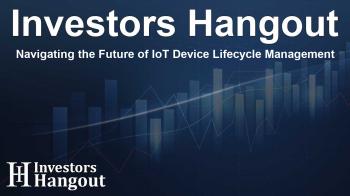Navigating the Future of IoT Device Lifecycle Management

Understanding the Challenges in IoT Device Management
The State of Industrial IoT Device Lifecycle Management shines a spotlight on the significant hurdles Original Equipment Manufacturers (OEMs) face in today’s software-driven economy. With insights gathered from a diverse group of over 500 embedded professionals, this report serves as a vital resource for understanding the evolving landscape of IoT device management.
The Growing Importance of Secure Device Management
As the adoption of Internet of Things (IoT) technology accelerates, OEMs are finding that their capability to manage smart devices securely and efficiently throughout their lifecycle is becoming essential. The recent report outlines the current progress organizations have made and the persistent gaps that need addressing.
Key Insights from the Report
Significant findings reveal that security and timely product launches are equally deemed essential business priorities. Yet, many organizations find it challenging to achieve a balance between the two. Here are some highlights:
- Compliance Challenges: Alarmingly, only 20% of OEMs have put a compliance plan in place for the upcoming EU Cyber Resilience Act, though the deadline is fast approaching.
- Software-Induced Delays: Almost half of all delays in product launches are attributed to software-related issues, such as bugs and necessary security patches.
- Maturity of Device Lifecycle Management: Over one-third of organizations report that prioritization issues hinder the establishment of effective Device Lifecycle Management (DLM) processes.
Adapting to a Software-Centric World
Today's market demands a significant shift in mindset, moving away from traditional product-centric strategies towards software-first innovations. As software becomes increasingly central to the value of products, the complexities of managing connected devices grow considerably. OEMs must consider their approaches to product development, maintenance, compliance, and customer relationships.
Eystein Stenberg, co-founder and CTO of Northern.tech, states, "The shift to software-defined products requires more than acknowledgment; it demands mature, secure, and scalable infrastructure. This is crucial for effectively managing a fleet, whether it consists of industrial robots or millions of connected medical devices."
Bridging the Gaps in Compliance and Cybersecurity
While interest in cybersecurity and regulatory requirements is high, actual implementation remains a significant hurdle for many OEMs. Security and compliance should not be viewed as afterthoughts; they must be integrated into the entire lifecycle, from design to deployment.
The report indicates a concerning maturity gap in strategies for IoT security. Although more than half of the respondents believe they comply or will comply with necessary regulations, nearly 20% do not have a compliance strategy. Furthermore, under 25% can implement a security update within a few weeks, showing a disparity between perceived readiness and reality when it comes to incident response.
Support for the Expanding IoT Ecosystem
With the increasing impact of IoT and connected devices, OEMs are gradually acknowledging the strategic necessity to adapt. Transitioning to a software-centric economy presents OEMs with new technical, operational, cultural, and strategic challenges they must conquer to maintain competitiveness and deliver value.
This enlightening report serves as a benchmarking tool for OEMs, helping them gauge their progress, recognize potential threats, and discover effective strategies that industry leaders are employing to thrive in a software-first environment.
Frequently Asked Questions
What is the main focus of the report by Northern.tech?
The report emphasizes the critical gaps and challenges in managing the lifecycle of industrial IoT devices, particularly in relation to software and cybersecurity.
How are OEMs handling compliance with cybersecurity regulations?
It appears many OEMs lack a comprehensive compliance strategy, highlighting significant challenges ahead as regulations tighten.
What impact do software issues have on product launches?
Software-related problems are responsible for nearly half of the delays in product launches, indicating a strong need for improved processes in this area.
Why is a digital-first mindset crucial for OEMs?
In today's landscape, a digital-first approach is essential for innovation, customer retention, and successfully managing the complexities of connected devices.
What strategies should OEMs consider to enhance their product lifecycle management?
OEMs should focus on integrating security and compliance into every stage of product development while cultivating a robust digital infrastructure to support software-driven growth.
About The Author
Contact Dylan Bailey privately here. Or send an email with ATTN: Dylan Bailey as the subject to contact@investorshangout.com.
About Investors Hangout
Investors Hangout is a leading online stock forum for financial discussion and learning, offering a wide range of free tools and resources. It draws in traders of all levels, who exchange market knowledge, investigate trading tactics, and keep an eye on industry developments in real time. Featuring financial articles, stock message boards, quotes, charts, company profiles, and live news updates. Through cooperative learning and a wealth of informational resources, it helps users from novices creating their first portfolios to experts honing their techniques. Join Investors Hangout today: https://investorshangout.com/
The content of this article is based on factual, publicly available information and does not represent legal, financial, or investment advice. Investors Hangout does not offer financial advice, and the author is not a licensed financial advisor. Consult a qualified advisor before making any financial or investment decisions based on this article. This article should not be considered advice to purchase, sell, or hold any securities or other investments. If any of the material provided here is inaccurate, please contact us for corrections.

